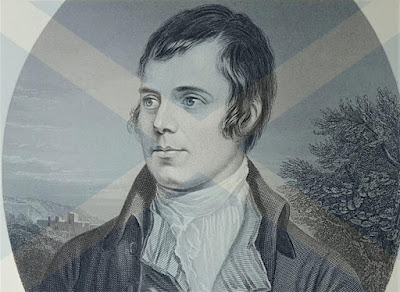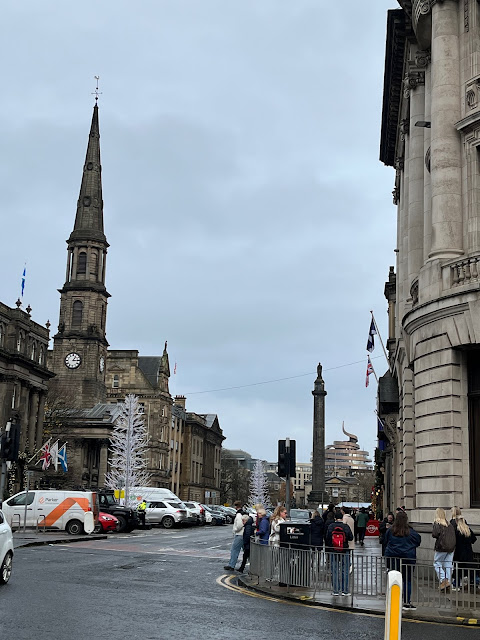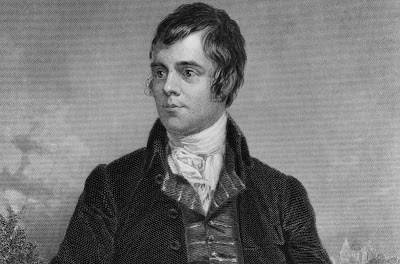Burns and other poets) wrote with Scots voices and language - why is Robert Burns not included here?
At a time when mainly English Tory unionist voices were being heard late 1700s. No other writer has done more than burns. I was taken back, at the new Scottish galleries that there is only one mention of DB, with regard his The Hunt poem and an Edinburgh tea room painting.
Its wonderful to see the new galleries. I realise Scott lived in Edinburgh, but Burns was there for quite a few months over the late 1786 and into 1787, and he was greatly influenced by his time there – he visited the men’s clubs – the Crochallan Fencibles Anchor close; William Creech’s bookshop and publishing house, at the Luckenbooths near St Giles, where each day the great and the good met; and the literary parties that Burns was invited to, where he met the renowned scholars of the Scottish enlightenment. He also met the great love of his life late 1786, Agnes McLahose: (his Clarinda) who he wrote many love letters to and his famous song of parting Ae Fond Kiss.
Scott may have been read widely in 1800s – but to my mind (and most other Scots) Burns is our national hero and bard. We was painted by his good friend, the artist Alexander Nasmyth – on their walks to Rosslyn.
As i walked around the Scottish art I thought - which Scotland are we emboldening and remembering here? After the first section covering the romantic period – we enter the brighter more modern period, with the windows open to the east Princes st garden views. I felt that the Burns creative legacy was a deliberately forgetting – Question? does his writing influence Scottish art. Burns was himself influenced by art – the symbolism and spiritual connection between the natural world, the creative fires and the established church teachings from his father – where dance was frowned upon. These strong interconnections.
He was influenced by the Ossian poems –by James MacPherson as the first Scot’s bard and also by other great poets. Burns was writing and collecting song before Scott – in fact he met the young 16 year old Scott at an Edinburgh literary party and Scott wrote about Burns after this great meeting.
Burns was influenced by art and the close ties between our emotional life and nature – when he wrote one of the best love songs ever written - "Till a’ the seas gang dry, my Dear/ And the rocks melt wi’ the sun/ I will luve thee still, my dear, While the sands o’ life shall run."
It is hard to believe that Burns didn’t influence Scottish art with all the myths, memorabilia, statues and more that surround the great poet. Even so, his songs and poems were not enough to prevent the forgetting that occurred across Scotland over the 1800s. Today, as Lesley Riddoch writes in her 2023 book Thrive, ‘Scots know of William Wallace and Robert Bruce but nothing in-between up to modern times. Only in the past few decades have Scots recognised other great Scots from the 1980s onwards – with statues to James Clerk Maxwell and Adam Smith.
* * * * *
 |
| novelist Walter Scott |
 |
| Scots bard Robert Burns |
II The galleries hold 60,000 works of Scottish art – from David Willkie, Alexander Nasmyth, Andrew Geddes, The Glasgow boys impress, particularly James Guthrie, and grand displays of William McTaggarts work. BUT Which Scotland – the empty Scotland or militarised? The proud Scotland or the shot stag. Romance or reality; mountain or flood;Ttory or Jacobin?
At the start of the exhibition there is an emphasis on the influence of Walter Scott’s historical fiction – Waverly and Heart of Midlothian. Scott was the inventor of historical novel. There is the claim “Nobody did more to popularise Scotland than Scott.’ There are photos of the construction of the imposing Scott monument nearby. David Octavious Hill’s pioneering photography, (a photography department at RSA 1857). On display is the painter John Drummond, and David Allan’s’ paintings of everyday life, the Porteous Riots.
*But I was surprised and saddened no mention of our great bard Robert Burns.
Moving on into the bright lit galleries with windows looking out onto east Princes st gardens displaying more modern art – the Glasgow boys, William McTaggert – The Sailing of the Emigrant ship, who was influenced by Constable 1776 – 1837 and Turner (1775- 1857). The Impressionist and Japanese print influences – of James Guthrie, Arthur Melville, Edward Arthur Waltour.
 |
| James Guthrie |
Symbolism and Celtic revival 1890s - the alternative world of dreams, myths and visions. With John Peploe, George Leslie Hunter. And good to see several wmen artists – Frances Campbell Cadell, Anne Redpath. Margaret Macdonald, There is so much to be impressed with here and both the particular Scottish influence of Scotland soft ever changing light. The weather beaten and mountainous landscapes – the Celtic Ossian, Gaelic poetry, alongside other great Scots scholars and poets 1700s - Dunbar, Allan Ramsay, Robert Fergusson, Robert Burns - who kept Scot’s voices alive.
And of course Walter Scott’’s historical novels, which were popular worldwide. Political philosopher Tom Nairn criticised Scott - that he told of a ‘romanticised Scotland’ that was gone and lost forever’. This led to Scotland’s literacy voice being lost over the 1800s.

.jpg)
.jpg)
.jpg)



.jpg)































.jpg)
.jpg)








.png.article-962.jpg)
